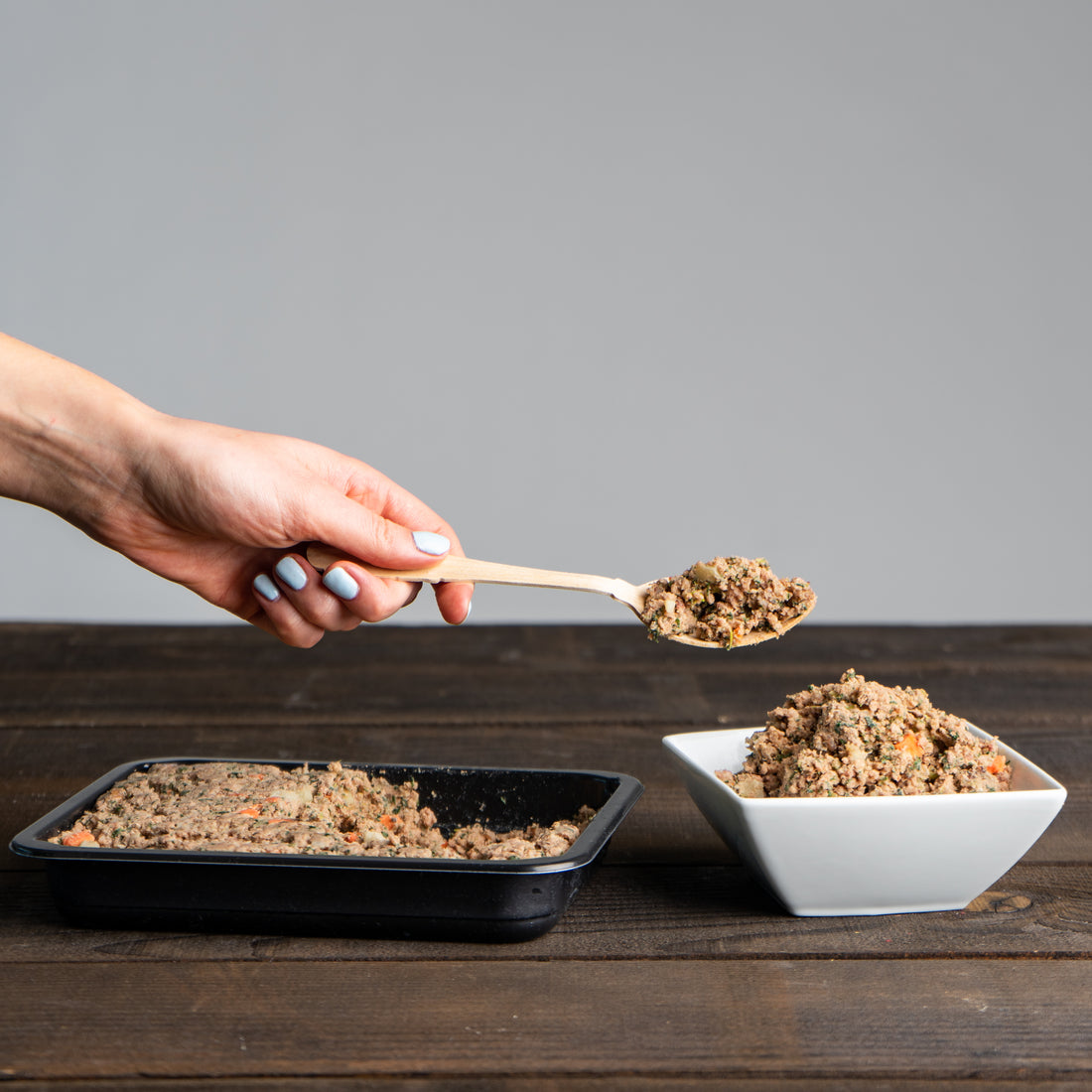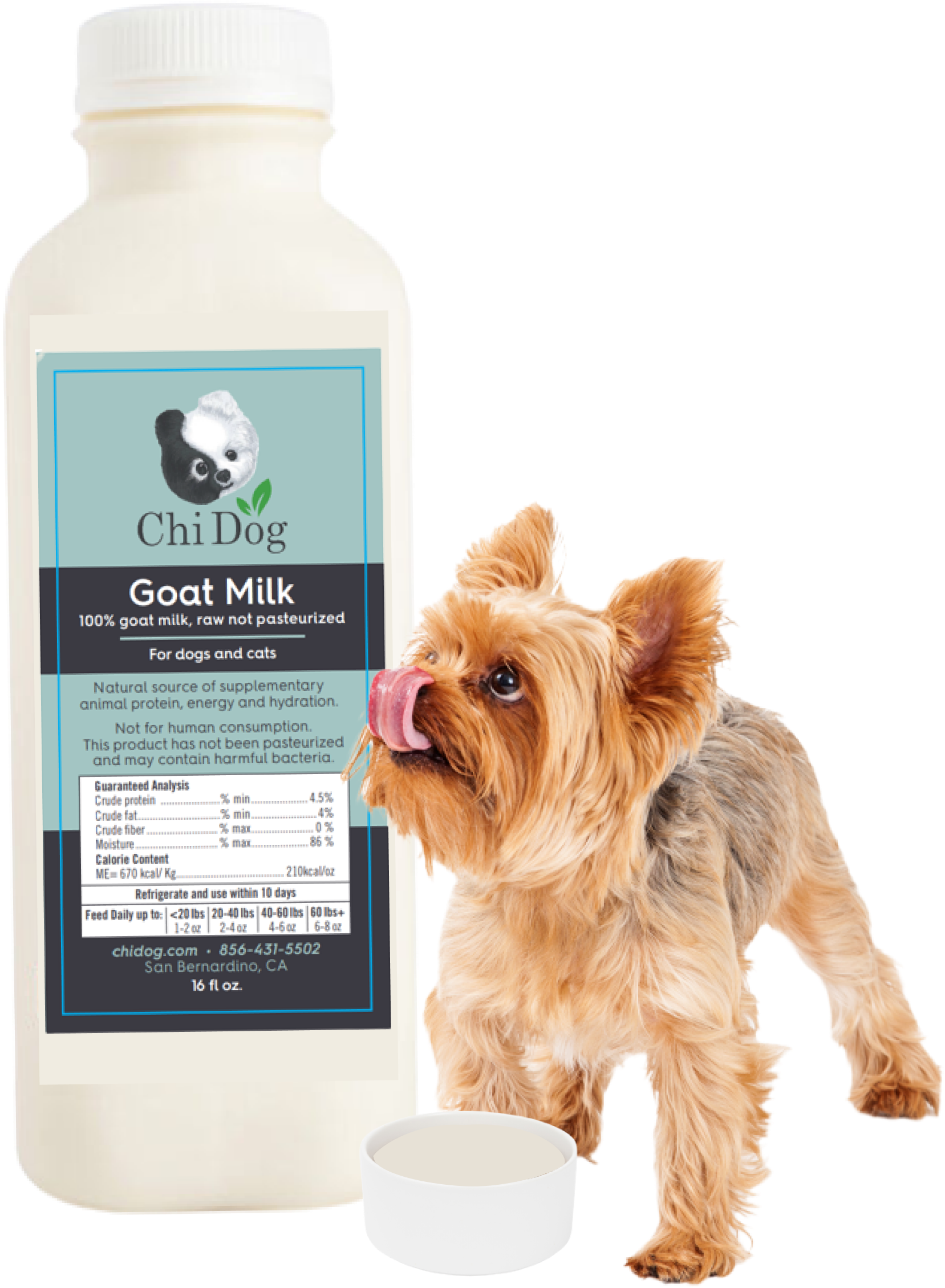
Best Food For Dogs With Seizures: Homemade Dog Food for Seizures vs Chi Dog Recipes

Watching your beloved four-legged friend go through a seizure is nothing short of heart-wrenching. The fear, the confusion, and the helplessness you feel are overwhelming.
You've been through the veterinary visits, the tests, and perhaps even medications, yet a lingering question remains: is there something more I could be doing?
The answer may be closer than you think - right in your dog's food bowl. While seizures can have various triggers, the role of diet is often underestimated. That’s why we’re going to guide you through what separates the best food for dogs with seizures from the rest, empowering you to be the pet parent they deserve.
We’ll examine the deep connections between seizures and food, the dilemma of homemade dog food for seizures, and why our Wood Diet stands unparalleled as the best dog food for seizures.
Your pet deserves nothing less than the best, and we're here to help you provide just that. First, let’s go over the causes and symptoms of dog seizures.

Causes and Symptoms of Seizures in Dogs
Before we can unveil the best dog food for seizures, we need to peel this troublesome condition back layer by layer. After all, understanding causes and symptoms is key in providing timely treatment and preventing future flare ups.
Common Causes: From Epilepsy to Toxins
Seizures in dogs are a neurological disorder that can stem from a range of causes. At the top of the list is canine epilepsy, a chronic condition where repeated seizures occur over time.
But epilepsy is just the tip of the iceberg. Other potential culprits include metabolic issues like low blood sugar, exposure to toxins such as rat poison or certain human foods like chocolate, and even certain infectious diseases. Brain tumors and trauma can also be factors.
Identifying Symptoms: What Does a Seizure Look Like?
Recognizing the signs of a seizure in your dog is crucial for timely intervention. The most evident signs are convulsions, where the dog may fall on its side, paddle with its legs, or even lose consciousness.
Other subtle indicators include excessive drooling, disorientation, and brief episodes of unresponsiveness. Some dogs might vocalize or attempt to hide before a seizure occurs. Each dog's symptoms can vary widely, so keep a close watch for any abnormal behaviors.
Veterinary Diagnosis: What to Expect
If you suspect your dog is experiencing seizures, immediate veterinary care is essential. Your vet will perform a thorough examination, which may include blood tests, urinalysis, and potentially advanced diagnostic tests like an MRI or a spinal tap.
Accurate diagnosis often requires a detailed history, including the frequency and duration of the seizures, and may involve ruling out other conditions that can mimic seizures, such as fainting spells or certain types of involuntary movement disorders.
Understanding the underlying causes and symptoms of seizures is the first step toward effective management. From there, you can start to consider the possibility of feeding your pet homemade dog food for seizures or investing in the best food for dogs with seizures.
That being said, what is the link between seizures and diet in dogs?
The Link Between Dog Seizures and Diet
In viewing dog seizures through the lens of traditional Chinese medicine (TCM), there are two mechanisms by which diet can play a role. This includes inflammation and deficiencies/excess in key vitamins & minerals.
Inflammation: The Silent Agitator
The food your dog eats plays an essential role in its overall health, and that includes neurological well-being. One of the ways diet impacts seizures is through inflammation.
Foods high in processed carbohydrates and sugars can induce an inflammatory response within the body, impacting the nervous system. Even grain-based diets that seem innocuous can sometimes act as inflammation triggers.
Inflammation can increase the excitability of the brain's neurons, making seizures more likely. That's why a diet rich in anti-inflammatory foods like fresh vegetables and high-quality proteins can serve as a natural buffer against the occurrence of seizures.
The Wood Diet, carefully formulated with anti-inflammatory ingredients, is designed to support your dog's neurological health. More on the best food for dogs with seizures later on.
Deficiencies and Excesses: Vitamins and Minerals
Nutritional imbalances can also play a significant role in the onset and severity of seizures. For example, deficiencies in key nutrients like magnesium or B vitamins can make dogs more susceptible to seizures.
Magnesium, for instance, is known for its role in muscle relaxation and nerve function - deficiency can lead to increased muscle spasms and neuronal excitability.
On the flip side, excessive amounts of certain nutrients like sodium or lead can also induce seizures. That's why it's crucial to have a well-balanced diet for your dog.
This begs the question…should you create homemade dog food for seizures as either a preventative measure or treatment?
Should You Create Homemade Dog Food For Seizures?

As a concerned dog owner, the idea of controlling every ingredient that goes into your pet's meal can be incredibly appealing.
A homemade diet seems like a natural step towards ensuring better health, especially for dogs prone to seizures. But, it’s important to be aware of the challenges of creating homemade dog food for seizures.
Let's delve into what home cooking for your dog entails and provide a few tips on how to make the best homemade meal for a dog experiencing seizures. Then, we’ll talk about an alternative option: getting the best food for dogs with seizures at Chi Dog.
The Appeal of Home Cooking
There's something genuinely comforting about the idea of feeding your dog a meal made with your own two hands. It provides you with full control over the ingredients, which is an undeniable boon, especially if you've identified specific triggers for your pet's seizures.
Home cooking also allows you to choose high-quality, fresh, and organic produce, catering the meal to your dog's unique nutritional needs. That being said, it’s not for everyone.
The Challenges: Time, Knowledge, and Consistency, and Safety Concerns
Cooking for your dog is not as simple as tossing a few leftover pieces of chicken and rice into a bowl. A well-balanced dog diet should be nutrient-specific, especially when dealing with health issues as serious as seizures.
The time commitment in both research and cooking can be considerable. You'll need to consult veterinarians and perhaps even veterinary nutritionists to make sure the diet you're creating is well-rounded and free of seizure-inducing triggers.
Consistency is another challenge - while you may prepare a nutritionally balanced meal one day, can you guarantee the same level of quality day after day? Also, there's a risk of foodborne illnesses if the food isn't stored or cooked properly.
All of this is why creating homemade dog food for seizures ultimately ends up being too much work for most pet parents, who have no shortage of other responsibilities to worry about. That being said, we’ll still offer some advice on creating the best homemade food for dogs with seizures below.
Advice on Creating the Best Homemade Food for Dogs With Seizures
If you're going the homemade route, focus on anti-inflammatory foods that are rich in quality proteins and low in processed carbohydrates.
Ingredients like fresh salmon, sweet potatoes, and leafy greens can be beneficial. However, even when striving to make the best homemade meals, the correct balance of vitamins and minerals is tricky to achieve without expert advice.
If you're contemplating homemade dog food for seizures, the questions, concerns, and responsibilities may make you realize that you need an easier, safer, but equally effective alternative.
So, let’s officially introduce you to the best food for dogs with seizures to provide you with peace of mind, and more importantly, relief for your pet.
The Best Food for Dogs With Seizures
The weight of making the right choices can feel extra heavy when your dog suffers from seizures. Dietary choices can be a key in managing this condition, and Chi Dog’s Wood Diet emerges as a stand-out option for a multitude of reasons.
Before we explain what makes it the best dog food for seizures, let’s introduce ourselves officially.
The Chi Dog Difference
Choosing Chi Dog isn't just about buying dog food - it's about embracing a holistic philosophy rooted in Traditional Chinese Medicine (TCM). All of our recipes are designed to fit not just the breed but the individual personality and health needs of your dog.
Our approach to creating holistic dog food is backed by AAFCO (Association of American Feed Control Officials) guidelines, ensuring that our food meets all the nutritional levels necessary for all life stages of your dog's life.
We deliver right to your doorstep, whether it's midweek or the end of the week. We offer an easy cancel, pause, or change option for your meal plan at any time, providing you with the flexibility you need. This ensures that you're not just giving your dog the best food but also saving yourself from the headaches of last-minute pet store runs.
While we’ll talk about the best dog food for seizures specifically, we have diets to address all the common conditions and complications pets can suffer with.
That includes the best food for ibd in dogs, the best dog food for anxiety, the best food for overweight dogs, the best food for dogs with skin allergies, the best diet for a dog with pancreatitis, the best diet for a dog with liver disease, and the best dog cancer diet recipe along with a whole lot more.
For now, though, let’s talk about the best dog food for dogs with seizures: the Wood Diet.
Our Wood Diet: The Best Food for Dogs With Seizures
At just $6/day, the Wood Diet provides a complete, balanced, and vet-approved solution that goes far beyond mere sustenance. Based on the results other pet parents have gotten, it’s an excellent choice for anyone searching for the best food for dogs with seizures. The Wood Diet ingredient list includes:
- High-quality Chicken: The primary protein source that's easily digestible.
- Brown Rice: A low-glycemic carb that provides sustained energy without spiking blood sugar.
- A Variety of Vegetables: Including Chinese Eggplant, Carrots, and Broccoli that provide essential vitamins and minerals.
These ingredients come together in a formulation that has a guaranteed high protein (17.5%) and moderate fat (6%) content, ensuring your dog gets what it needs without unnecessary fillers or by-products. It also has the added benefits of liver support, making it ideal for dogs with seizures.
Plus, it has a low carbohydrate composition at just 10%. All these percentages are meticulously calculated to create the most beneficial diet possible for dogs with sensitive conditions like seizures.
We encourage you to learn more about the role our diets can play in elevating your pet’s livelihood. But for now, let’s talk about how to feed your pet the best dog food for seizures.
How to Feed Your Pet the Best Dog Food for Seizures
Transitioning your dog to a new diet, especially when dealing with a sensitive condition like seizures, should be a thoughtful and gradual process. The Wood Diet from Chi Dog comes in pre-portioned packages, simplifying the shift. Here's how to go about it:
- Consult Your Veterinarian: Always start with a vet consultation to ensure that the Wood Diet aligns with your dog's specific healthcare needs.
- Introduce Slowly: Start by mixing 25% of the Wood Diet with 75% of your dog’s current food. Monitor for any changes in seizure frequency or behavior.
- Increase Gradually: After 2-3 days, if no adverse reactions are observed, increase to a 50-50 mix. Continue this trend until your dog is entirely on the Wood Diet.
- Observation: Keep a close eye on how your dog responds, not just in terms of seizures but also digestion, energy levels, and overall well-being.
- Adjust Portions: While our diet is pre-portioned, you may find that your dog's activity level or metabolic rate requires adjustments.
- Consistency is Key: Stick to feeding schedules and portion sizes as consistently as possible. The more regular the routine, the easier it will be to monitor changes relevant to seizure activity.
- Regular Vet Visits: Make sure to have regular check-ins with your veterinarian to assess the diet's impact on the seizure condition and make any necessary adjustments.
- Monitor and Modify: Keep a log or use an app to record seizure incidents, behaviors, or symptoms that might warrant a reassessment of the diet plan.
With these tips, you can start feeding your pet the best dog food for dogs with seizures in confidence. But, beyond what you feed your pup, follow these additional tips below on managing and treating seizures in dogs.
Additional Tips on Managing & Treating Seizures in Dogs

A comprehensive approach is crucial for treating a dog living with seizures. While a well-balanced diet like our Wood Diet can be transformative, there are other aspects to consider for a holistic approach to managing your pet's condition.
Medication and Monitoring: The Conventional Route
Pharmaceutical intervention is often the first line of defense against seizures in dogs. Medications such as phenobarbital or potassium bromide are commonly prescribed to control seizures.
However, these medications come with their own set of challenges including potential side effects like lethargy, increased thirst, or even liver damage. Monitoring is critical here; regular vet check-ups and blood tests can help ensure the medication is effective without being detrimental.
Complementary Therapies: Acupuncture, Herbal Medicine, and More
Traditional Chinese Medicine offers a range of complementary therapies that can work alongside or sometimes replace conventional treatments. Acupuncture, for example, has been shown to provide substantial relief in controlling seizures in some dogs.
Herbal medicines, often formulated specifically for your dog's condition by a veterinary herbalist, can also be a natural way to manage seizures without the side effects commonly associated with pharmaceuticals.
Lifestyle Changes: Exercise, Sleep, and Stress Reduction
You might be surprised how much a dog's lifestyle can influence their susceptibility to seizures. Consistent exercise can help regulate the neurotransmitters in the brain, potentially reducing seizure frequency.
Sleep is another cornerstone of effective seizure management. Just like humans, dogs need adequate rest for their nervous systems to function optimally.
Stress is a common trigger for seizures, so finding ways to create a calm environment can significantly benefit your dog. Techniques could range from simple changes like providing a quiet, dark space for your pet to complex solutions like behavior modification training.
By adopting a multi-pronged approach like this, you're not just treating symptoms - you're enhancing the quality of your dog's life. And isn't that what we all want for our four-legged family members?
Final Thoughts on the Best Dog Food for Seizures: Homemade vs Chi Dog
Managing seizures in your dog is a multi-faceted challenge that demands a holistic approach for maximum effectiveness. While homemade dog food for seizures might seem appealing, it comes with hurdles like time commitment, nutritional imbalances, and safety concerns.
In contrast, Chi Dog's Wood Diet provides a balanced, vet-approved solution that's specifically designed to support dogs with seizures, offering convenience without compromising quality. It’s the best dog for seizures and you don’t have to take our word for it. It’s vet-approved!
Why gamble with your pet's health? Make the smart choice in Chi Dog's Wood Diet. Start your journey to helping your pet heal and live a happier life today!
_________________________________________________________________________
About the author
Dr. Susan Bohrer has been a practicing veterinarian for 15 years teaching home cooking techniques to clients. Dr. Bohrer is Certified in Traditional Chinese Veterinary Medicine’s Herbal Therapy, Acupuncture and Food Therapy.



